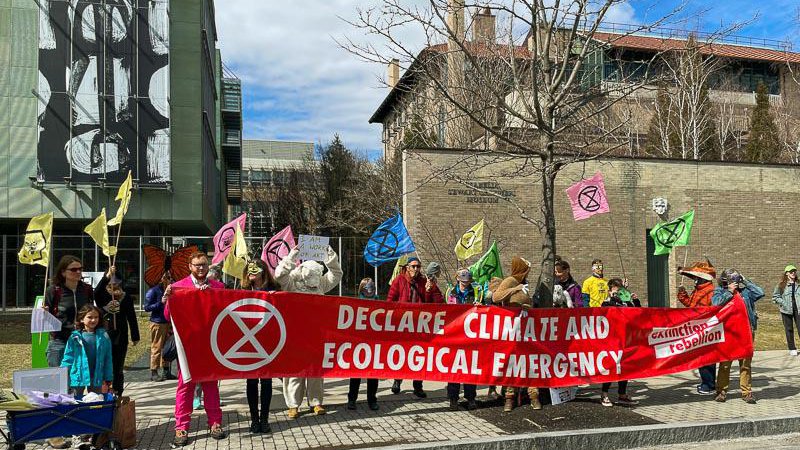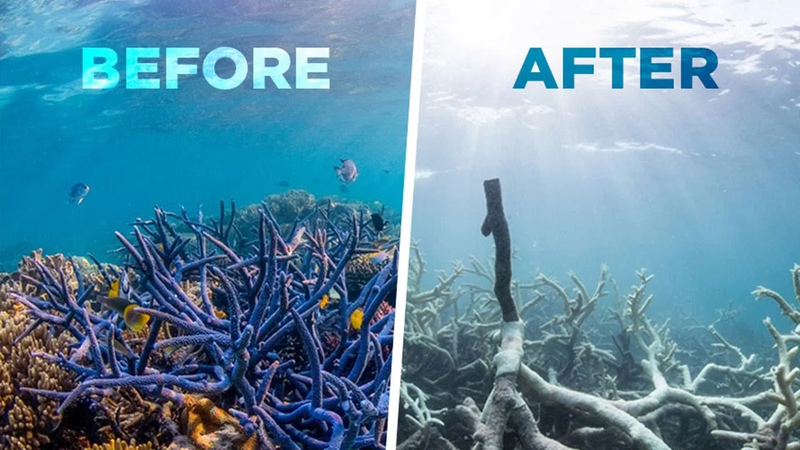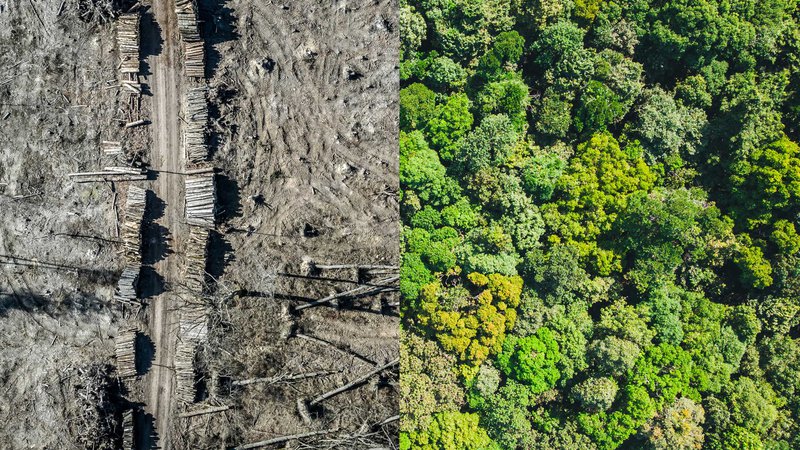
Climate Activists Hold Funeral On Revere Beach, to Honor Lost Ocean Life and Call for Action
On Friday July 7, twelve members of Extinction Rebellion Boston gathered together with local residents on Revere Beach to mourn the loss of our marine species. Dressed in funeral attire and costumed as "ocean people," the group walked slowly through the crowds of summer revelers, carrying artistic fish puppets. Shortly before the march began, one activist delivered a "eulogy for the ocean" for the assembled crowd, including phrases like "Dearly beloved, we are gathered here today to mourn the loss of our marine species" and "We need our leaders to take action now. Life on this earth began in the ocean, we have these waters to thank for our existence, and our health as humans and as a planet lies in our oceans." The funeral procession continued until the mourners reached the shore across from the pedestrian bridge, pausing every few moments to pay honors to extinct and endangered marine animals. Then shared a moment of silence for the ocean life that has been lost at the hands of humanity's misuse of resources.
When asked why they participated in the beach funeral to protest biodiversity loss, one East Boston activist responded, "I love to grill and take my pets out in the yard, but I can't anymore because of the rat poison that neighbors put out. They do this because they are afraid their families will get bit by rodents. I would argue that we don't have a rat problem at all. We have a falcon, hawk, grackle, and coyote shortage. We have that shortage because we have a human infestation. When there is a disruption in biodiversity, it ripples out and spreads in ways that can be impossible for the average person to predict, but can have a direct impact on day-to-day life."
The East Boston activist continued, "Our oceans are strong and beautiful, but they can only take so much and one by one marine species are dying out. We need our leaders to take action now. Life on this earth began in the ocean, we have these waters to thank for our existence, and our health as humans and as a planet lies in our oceans. At this Beach Funeral, we honor the water, the life it has given us, and the life we have taken away."
Background for this demonstration:
In 1896, the Revere Beach shoreline became the first public beach in the nation, meaning that 1896 marks the year that Westerners transformed "land" into "property." In the decades leading up to this, train tracks were laid directly on the shoreline, devastating the habitats of native creatures. We have recently moved on as a culture from such visibly invasive infrastructure, but the subsequent and ongoing impact of climate change due to human activity and reliance on fossil fuels persists; with arctic temperatures now reaching 100 degrees, rising waters will take back the the beach.
Without systemic changes to global infrastructure, our ocean life is on the brink of extinction. Increased water temperatures have led to coral bleaching and made conditions unlivable for many species. Both rising levels of carbon dioxide in the atmosphere and rising water temperatures in the ocean make a deadly combination by increasing ocean acidity, destroying ecosystems that depend on our coral reefs.
Wealthy nations have treated these sacred waters as a waste management system, moving our trash out of sight while ignoring the immediate and long-term harms that debris and plastics sent far away have on the health of marine species and ultimately ourselves as humans. In a single year, 10 million tons of plastic are dumped in the ocean every year, and 100,000 marine animals die due to entanglement in plastic debris. Last year, plastic particles were newly found in antarctic snow and in our bloodstreams. Too often what we throw away is sent to people in other countries to take care of - we’ve been told to reduce, recycle, and reuse, only to discover that people in places like Malaysia are left to clean up the mess that our government outsources to them. There is no excuse for this crime on the hands of our nation’s leaders.
Reliance on fossil fuels continues to directly harm marine species. Many may remember the 2010 BP oil spill in the Gulf of Mexico, which lasted for 87 days before it was finally capped. Oil from that spill remains in estuaries and deep waters, and animals that survived are struggling to rebound. Yet our government pushes forward with more drilling, more pipelines, and almost always in marginalized communities at the expense of the poor and non-white.
Extinction Rebellion's Demands for the Massachusetts Government
Leaders must declare a climate and ecological emergency. We demand to protect at least 30% of land and ocean by 2030 on a national and on the state level. The global "30x30" target protects areas from drilling, logging, and other types of extraction to protect habitat for species threatened by extinction.
On the national level, President Biden is publicly claiming to commit to the "30x30" pledge, an effort by the global community to conserve 30% of terrestrial and marine habitat by 2030. Yet with the oil and gas drilling permits from his first year in office outpacing Trump's first year by 34% and his administration's approval this March of the Willow Project to allow new oil drilling in Alaska, these commitments are clearly being made in name only. In addition, many of his established 30x30 land protections are focused on the western US, which means that Governor Healey needs to implement a 30x30 commitment for the Commonwealth rather than waiting for national support. In Massachusetts, only about 5% of the land and 1.5% of the ocean are protected from logging and mining, a far cry from the 30% nationwide pledge.
Extinction Rebellion urges both President Biden and Governor Healey to put a stop to logging and offshore drilling and to hold companies accountable for the mess they're causing. The public must mobilize to hold the fossil fuel industry accountable and push for an end to the continuous development of yet more oil and gas infrastructure right here in Massachusetts. Constituents can call their state representatives to commit to 30x30, protest local habitat loss in their own area, and join Extinction Rebellion or any climate-focused group to directly push back against inaction.
Related Stories:
Featured:
-
The third annual Week of Rebellion is full of opportunities for celebration and action!
-
Our government had the opportunity to finally turn our state into a "climate leader," and they decided yet again to prioritize profits and political posturing over the well-being of residents.
-
Prominent climate scientists and activists demand immediate climate action in the United States.
-
Stop the Fossil Fuel Industry, Now: List of events for Extinction Rebellion Boston's September week of rebellion
-
A compilation of books, movies, articles, and ways to take action to protect Black lives
-
Nadia Colburn, PhD and member of Extinction Rebellion Media team, discusses how to talk about the climate and ecological crisis with family and friends.
Upcoming Events:
-
Fri Feb 20th @ 6 p.m.
-
Sat Feb 21st @ 2 p.m.
-
Sun Feb 22nd @ 10:15 a.m.


